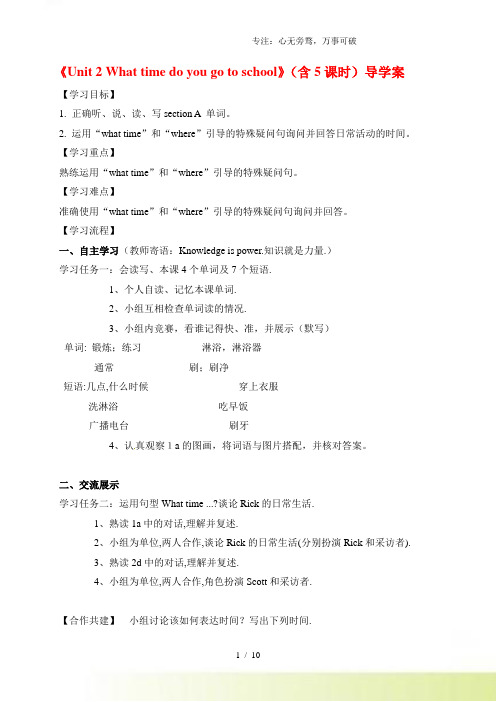【名师测控】2016七年级英语下册 Unit 2 What time do you go to school Period 2课件
- 格式:ppt
- 大小:1.80 MB
- 文档页数:13

人教版英语七年级下册第二单元Unit 2 What time do you got o school? Section A Grammar focus预习导学同学们,以下是人教版英语七年级下册第二单元Unit 2 What time do you go to school? Section A Grammar focus预习导学内容,希望对大家有所帮助。
预习目标:1、掌握以下单词和短语:never , early , fifty , job , work , station , radio station , o’clock , night , funny , exercise。
2、巩固关于时间的表达方式。
3、熟练掌握句型:(1)、What time is your radio show? 你的广播节目是在几点?回答:From twelve o’clock at night to six o’clock in the morning.从晚上十二点到早上六点。
(2)、What time do you usually get up ? 你通常几点钟起床?回答:At eight thirty at night. 在晚上八点半。
(3)、When do you go to work? 你几点去上班?回答:At eleven o’clock. 在十一点。
预习过程:一、单词过关。
根据汉语提示,写单词。
1、通常__________2、整点__________3、运动、锻炼__________4、工作、上班_____________5、周末____________6、总是___________7、早餐__________ 8、最好的___________ 9、从不_____________10、小组_________ 11、迟到的___________ 12、晚餐___________13、淋浴、淋浴器_________ 14、活动_________ 15、同学__________参考答案:1、usually2、o’clock3、exercise4、work5、weekend6、always7、breakfast8、best9、never 10、group 11、late 12、dinner 13、shower 14、activity 15、classmate二、短语过关。

《Unit 2 What time do you go to school》(含5课时)导学案【学习目标】1. 正确听、说、读、写section A 单词。
2. 运用“what time”和“where”引导的特殊疑问句询问并回答日常活动的时间。
【学习重点】熟练运用“what time”和“where”引导的特殊疑问句。
【学习难点】准确使用“what time”和“where”引导的特殊疑问句询问并回答。
【学习流程】一、自主学习(教师寄语:Knowledge is power.知识就是力量.)学习任务一:会读写、本课4个单词及7个短语.1、个人自读、记忆本课单词.2、小组互相检查单词读的情况.3、小组内竞赛,看谁记得快、准,并展示(默写)单词: 锻炼;练习___________ 淋浴,淋浴器___________通常___________ 刷;刷净___________短语:几点,什么时候_________________ 穿上衣服_________________ 洗淋浴_________________ 吃早饭_________________广播电台_________________ 刷牙_________________4、认真观察1a的图画,将词语与图片搭配,并核对答案。
二、交流展示学习任务二:运用句型What time ...?谈论Rick的日常生活.1、熟读1a中的对话,理解并复述.2、小组为单位,两人合作,谈论Rick的日常生活(分别扮演Rick和采访者).3、熟读2d中的对话,理解并复述.4、小组为单位,两人合作,角色扮演Scott和采访者.【合作共建】小组讨论该如何表达时间?写出下列时间.9:00 ________________ 11:00 ____________10:30 _______________ 12:50 ____________三、知识反馈(一)根据汉语完成句子1. 我早上六点起床.I ______ ______ _______ six in the morning.2.他的爸爸晚上九点洗澡.His father ______ ______ _______ ____ nine in the evening.3.你每天早上七点跑步吗?_____ you _______ ______ seven every morning?4.你姐姐几点吃晚饭?______ ______ _____ your sister eat _______?5.我上班从不迟到.I’m_______ _____ ______ work.6.他十二点吃午饭.He ______ _____ at twelve.(二)句型转换,按要求改写句子.1.Alice takes a shower at 9:00.(提问划线部分)__________________________________________?2.I have some tea in my cup.(改为否定句)__________________________________________.3.The old man is seventy.( 提问划线部分)__________________________________________.四、学后反思____________________________________________专注:心无旁骛,万事可破Unit 2 What time do you go to school?第2课时【学习目标】1.熟练掌握本课的单词和部分短语.2.熟练运用句型询问时间,以及在某个时间干什么事What's the time? It's…What time do you usually…? I usually…at…3.能根据要求写出简单的句子表述自己和他人的日常活动.【学习重点】能根据要求写出简单的句子表述自己和他人的日常活动.【学习难点】一般现在时中不同人称对应的动词的变化形式.【学习流程】一、自主学习(教师寄语:Knowledge is power.知识就是力量.)学习任务一: 读写、记忆本课单词和短语.1.个人自读,记忆.2.小组互相检查读、写情况.3.根据汉语写出下列英语单词和短语并展示.单词:最好的_________ 小时_________ 组;群________ 牙齿__________ 短语:在周末_______________ 去上班_______________二、交流展示学习任务二: 通过练习描述一天的时间1. Grammar Focus2. Writing(3a,3b)3. Survey (3c)学习任务三:试着模仿说出自己的一天的活动三、知识反馈专注:心无旁骛,万事可破(一)单项选择1. The bus usually ________ him to work.A. takeB. takesC. /D. bring2. I usually go to school _________ seven o'clock..A. atB. inC. onD. for3. — What's the time? —__________ nine-fifteen.A. The time isB. It'sC. AtD. This is4.We go to ________at six thirty in the morningA. the schoolB. a schoolC. schoolD. schools(二)用括号内所给词的适当形式填空1.Alice brushes her __________(tooth) every morning.2.I t’s __________(fun) to play volleyball on the beach(沙滩).3.I usually get __________ (dress) at six in the morning.4.Tom is my __________ (good) friend in my class.5.My father __________ (work) in a school.四、学后反思____________________________________________专注:心无旁骛,万事可破Unit 2 What time do you go to school?第3课时【学习目标】1.正确听、说、读、写section B单词.2.能够利用所学句型询问及表述时间.3. 学会谈论自己或别人的日常生活,询问及表述时间.【学习重点】学会谈论自己或别人的日常生活,询问及表述时间。

Unit2:What time do you go to school? 知识点总结一.相关语法What time和when引导的特殊疑问句What time意为何时什么时候如果询问主语什么时候做某事可以用what time do/does加主语加动词原形加其他如果what time 用来提问具体时间那么可以用when替换When是询问大的时间点即什么时候频率副词always 百分之百usually 百分之八十often 百分之六十sometimes 百分之四十seldom 百分之二十never 从不一般频率副词放在动词bi后面实意动词之前二.时间的表达法1.询问时间:What’s the time?\What time is it?回答时常用It’s+点钟⑴整点用“钟点数+o’clock”表示如,seven o’clock⑵如果分钟在三十分钟以内,就用“分钟数+past+钟点数”表示如,7:25 twenty-five past seven⑶若超过三十分钟,就用“60-分钟数+to+下一整点数”表示如,7:40 twenty to eight⑷若为三十分钟,用half表示;若为十五分钟,用a quarter如,7:30 half past seven7:15 a quarter past seven如,10:20a.m.=10:20 in the morning3:10p.m.=3:10 in the afternoon4.What time do you usually get up?what time对时间点进行提问,when提问大时间5.What time dose Rick eat breakfast?—At seven o’clock.What time+do\does+主语+动词原形+其他?at既可用来表示时间,又可用来表示方位。
表示事件时,后面一般跟表示具体时间的词;表示方位时,指某人或某物所在之处。


Unit 2 What time do you go to school?说教材教材分析本单元主要学习用when 和what time 引导特殊疑问句询问时间的表示方式;学习表示频率的副词。
通过“谈论日常作息时间”这一话题,该单元设计了三个主要的学习任务型活动。
任务一:谈论自己的作息习惯,学习不同时间点的表达方式;任务二:学习运用when和what time来询问和表达作息时间安排;任务三:搜集社会上有关作息时间安排的情况,复巩固所学的知识。
通过本单元的学习,同学们能学会安排好自己的日常活动,并且能够了解和转述他人的日常生活安排。
单元重难点分析重点:1.时间的表达方法。
2.询问时间的句型:What time do you usually get up?When does Scott go to work?3.频率副词的用法。
难点:1.用when和what time引导的特殊疑问句。
2.频率副词的用法。
教学目标单词: up, dress, brush, tooth, shower, usually, forty, never, early, fifty, job, work, station, o'clock, night, funny,exercise, best, group, half, past, quarter, homework, run, clean, walk, quickly, either, lot, sometimes , taste , life短语:get up, get dressed, take a shower, radio station,on weekends,do (one's) homework, take a walk,either...or...,lots of句型:What time do you usually get up? I usually get up at six thirty.What time do they get dressed? They always get dressed at seven twenty.When does Scott go to work? He always goes to work at eleven o'clock, He's never late.When do your friends exercise? They usually exercise on weekends.语法:(1)时间表达法。

七年级英语下册Unit2 hat tie d u g t shl?重要知识点汇总七年级英语下册Unit2hattiedugtshl?重要知识点汇总【重点单词】up[>p]adv向上getup起床;站起dress[dres]v穿衣服n连衣裙getdressed穿上衣服brush[br>ʃ]v刷n刷子tth[tuːθ]n牙齿sher['ʃa<ə]n≈v淋浴n淋浴器(间)taeasher洗淋浴usuall['u:Duəli]adv通常地;一般地frt['f`:ti]nu四十[a<]inter(表示惊奇或敬佩)哇;呀never['nevə]adv从不;绝不earl['ɜːlɪ]adv≈ad早(的)fift['fɪftɪ]nu五十b[dD^b],[dDɑːb]n工作;职业r[ɜː]v≈n工作statin['steɪʃn]n电台;车站radistatin广播电台'l[ə'l^],[ə'lɑ:]adv(表示整点)……点钟night[naɪt]n晚上;夜晚funn['f>nɪ]ad奇怪的;滑稽好笑的exerise['esəsaɪz]v≈n锻炼;练习neeends周末best[best]ad最好的adv最好地;最grup[gruːp]n组;群half[hɑːf],[hæf]n≈prn一半;半数past[pɑːst],[pæst]prep晚于;过(时间)ad过去的quarter['`ːtə]n一刻钟;四分之一her['hə<ɜː]n家庭作业dher做作业run[r>n]v跑;奔lean[liːn]v打扫;弄干净ad干净的al[`ː]n≈v行走;步行taeaal散步;走一走quil['ɪli]adv很快地either['aɪðə],['iːðə]ad v或者;也(用在否定词组后)either…r…要么……要么……;或者……或者……lt[l^t],[lɑ:t]prn大量;许多ltsf大量;许多seties['s>taɪz]adv有时taste[teɪst]v有……的味道;品尝n味道;滋味life[laɪf]n生活;生命【重点短语】gtshl去上学2getup起床3getdressed穿衣服4brushteeth刷牙eatbreafast吃早饭6taeasher洗澡7hattie什么时间8atsixfrt在六点四十9aninterestingb一个有趣的工作0attheradistatin在广播电视台1usuall/alas/ften/seties/never经常/总是/经常/有时/从不2urradish你的广播节目3fr…t从…到…4atnight在夜晚afunntie一个有趣的时间6taeexerise锻炼7belatefr…因…迟到8atabuttentent在大约十点二十9neeends在周末20nshldas在上学日21halfpastsix六点半22aquarterpastthree三点过一刻(3:1)23aquartertten十点差一刻(9:4)24d(ne’s)her做(某人的)家庭作业2taeaal散步26gtbed睡觉27eatquil吃得快28haveuhtie有许多时间29halfanhur半个小时30gethe到达家31either…r或者……或者32eatagdbreafast好好吃顿早餐33ltsf=altf许多34begdfr…对……有益3tastegd尝起来好36dherher做她的家庭作业37haveahealthlife有一个健康的生活方式38havedinner吃晚饭【重点句型】hattiedugtshl?你几点去上学?2一hattieduusualltaeasher,i?瑞克,你通常几点钟淋浴?—Iusualltaeasheratsixfrt我通常六点四十淋浴。
1.你什么时候去上学?2.A通常什么时候去工作?他总是在11点钟去工作。
3.那是一个有趣的吃早餐时间。
4.她工作从来不迟到。
5.我最好的朋友有一份不错的工作。
6.她没有很多时间吃晚餐。
7.她知道这对于她来说不好,但是它吃起来不错。
8.我早晨7:00刷牙。
9.他们通常在周日做锻炼。
10.我有一个非常健康的生活。
11.迅速地12.有时13.我要么散步要么吃蔬菜。
14.组15.在五月16.在2000年17.在周六下午18.在晚上19.11:45 (2种)20.你的工作是什么?21.Alice有多少个淋浴器?22.从6:15到7:0023.上学日24.半个小时25.许多水果26.到家27.我没有太多时间吃早餐28.我有的时候打棒球打半个小时29.他要么看电视,要么玩电脑游戏。
30.要么你要么我是对的。
31..我也不喜欢吃水果或者蔬菜32.她知道这对于她来说不好,但是它尝起来味道不错33.去上学34.在那之后35.一个半小时36.晚上9.5537.他通常在早晨6:15 做运动38.一份有趣的工作39.起床40.去学校41.穿衣服42.刷牙43.吃早餐44.洗澡45.他在一个广播站工作。
46.你的广播节目是什么时候?47.去散步48.上床去睡觉49.打扫我的房间50.在周五早晨/ 在早晨51.两把刷子52.有许多工作要做53.做...的时间54.从不有时经常通常总是55.我最好的朋友最喜欢英语。
56.几点了?(2种说法)57.3:15 (2种)58.5:30 (2种)59.写出健康的n. / adj./ 反义词60.学校乐队61.一个女学生/ 2 个男学生62.有...的味道63.擅长于...与...相处的好对...友好对...有益64.我没有时间做某事65.她在上海工作。
66.首先。
/ 然后。
/接下来。
/最后67.从十二月默写到一月68. 第二单元作文构思1.When / What time do you go to school ?2.When does A usually go to work ?He always goes to work at eleven o'clock.3.That is a funny time for breakfast.4.She is never late for work.5.My best friend has a good job.6.She doesn't have much time for dinner.7.She knows it is not good for her, but it tastes good.8.I brush (my) teeth at seven o'clock in the morning.9.They usually exercise on the weekend.10.I have a very healthy life.11. quickly12.sometimes13.I either take a walk or eat vegetables.14.group 15.in May 16. in 200017.on Saturday afternoon18.in the evening / at night19. a quarter to twelve / eleven forty-five20.What is your job ? / What do you do?21.How many showers does Alice have ?22.from a quarter past six to seven o'clock23.on school days24.half an hour25.much/ a lot of/ lots of + fruit26.get home27.I don't have much time for breakfast.28.I sometimes play baseball for half an hour.29.He either watches TV or plays computer games.30.Either you or I am right.31.I don't like (eating) fruit or vegetables, either.32.She knows it is not good for her, but it tastes good.33.go to school34.after that35.an hour and a half36.five to ten in the evening37.He usually exercises / does exercise/ does sports/ plays sports at a quarter past six in the morning / at 6:15 a.m. / at 6:15 A.M..38.an interesting job39.get up 40.go to school41.get dressed 42.brush teeth43.eat breakfast 44.have a shower45.He works at a radio station.46.What time is your radio show ?47.have a walk/ go for a walk / take a walk48.go to bed49.clean my room50.on Friday morning / in the morning51.two brushes52.have much work to do53.time for...54.never / sometimes/ often / usually / always55.My best friend likes English best.56.What time is it ?/ What's the time ?57.three fifteen / a quarter past three58.five thirty / half past five59.health / healthy / unhealthy60.school band61.a girl student / two boy students62.have a taste of63.be good at...be good withbe good tobe good for64.I don't have time to do sth.65.She works in Shanghai.66.First.../ then.../ next.../at last67.December/ November / October/ September/ August / July / June / May / April / March/ February / January68.先再分说在几点钟做了什么事最后总说自己有一个什么样的生活。
山东省郯城县红花镇七年级英语下册Unit 2 What time do you go to school Section A Grammar Focus 3a-3c教案(新版)人教新目标版编辑整理:尊敬的读者朋友们:这里是精品文档编辑中心,本文档内容是由我和我的同事精心编辑整理后发布的,发布之前我们对文中内容进行仔细校对,但是难免会有疏漏的地方,但是任然希望(山东省郯城县红花镇七年级英语下册Unit 2 What time do you go to school Section A Grammar Focus 3a-3c教案(新版)人教新目标版)的内容能够给您的工作和学习带来便利。
同时也真诚的希望收到您的建议和反馈,这将是我们进步的源泉,前进的动力。
本文可编辑可修改,如果觉得对您有帮助请收藏以便随时查阅,最后祝您生活愉快业绩进步,以下为山东省郯城县红花镇七年级英语下册Unit 2 What time do you go to school Section A Grammar Focus 3a-3c教案(新版)人教新目标版的全部内容。
Unit2 What time do you go to school课题Unit2What time do you go toschool?Section A Grammar Focus 3a—3c课型New教学目标 1。
能听、说、读、写Unit 2 Section A的词汇和短语。
2. 学会用Wh at time提问时间点。
3. 学会描述时间点.4. 学会when 和what time的区别教学重点.1 会用what time提问时间点。
2. 会用英语表达时间点教学难点1。
at后加时间点。
2. 当人称是第三人称单数时,谓语动词经常忘记变为三单的形式教学设计教师活动学生活动Step1Pair work1. 通过图片让学生用第一人称、第二人称做关于日常行为的对话.A: What time do you usually …?B: I usually … at…2. 通过图片的形式和学生一起练习第三人称单数的用法。
Unit 2 What time do you get up? 知识讲解与练习1.What time do you get up?释:这是一个由疑问词what time(几点)引导的特殊问句。
其结构:What time +助动词do/does +主语+动词原形,询问某人做某事的具体时间。
例如:what time do you begin class in the morning?你们早晨几点开课?注:What’s the time=What time is it?也是用来询问时间,意为“几点了”。
用it作答。
例如:What’s the time? It’s 7:30.几点了?七点半了。
2.I usually get up at five o’clock.我通常在五点钟起床。
释: 1)句中usually与often 一样都是频度副词,常用于动词be 之后,行为动词之前。
always 意思是“总是”、“永远”,表示动作重复,状态继续,中间没有间断,通常用来修饰动词的一般时态。
例如:We always get up before six o'clock.我们总是六点前起床。
若修饰动词进行时,则有“老是”,“再三地”的意思,带有厌烦、不满、赞美等感情色彩。
例如:You are always coming late.你老是迟到。
(含有责备的意思)He is always thinking of others.他总是想着别人。
usually(75%)意为“通常”,着重表示已习惯的动作。
反义词为:unusually。
例如:They usually have four classes in the morning.他们上午通常上四节课。
They usually do some shopping on Sunday.他们通常星期天买东西。
often(50%)意为“时常”、“经常”,表示常常这样,但不总是这样,反义词为: seldom。
Unit 2 What time do you go to school ?Period2 SectionA2d-3c【教学目标】知识与技能(1)熟练掌握下列词汇:名词n. job, work, station, night, exercise, group形容词adj. funny, best 副词adv. o’clock, best(2)熟练掌握下列短语:on weekends from……to….. at night be late for sth 做某事迟到(3)掌握下列句型:What time do you usually get to school?I usually get up at six thirty.What time do they get dressed?They always get dressed at seven twenty.When does Scott go to work?He always goes to work at seven o’clock.He’s never late.过程与方法阅读,角色扮演,语法总结和练习,采访同学作息时间安排情感、态度与价值观让学生们学会谈论自己的日常生活及作息习惯;学会更合理地安排自己的学习和课外活动时间。
【教学重难点】重点:1. 能在日常情境中谈论日常作息时间。
2. 能用所学内容解决实际问题。
3. 学会使用第三人称操练目标语言。
4. 学习并区别频率副词always, usually and never.1. 目标语言的第三人称的使用。
2. 频率副词的使用。
【导学过程】一.新课预习翻译:工作_________ …点钟_________ 职业_________最好的________车站_______在周末____________ 夜,夜间__________ 练习________起床在晚上吃早餐上班迟到去工作_______________ 做…的时候有趣的工作____________阅读2d回答下面问题a. What time does Scott usually get up?b. When does he take a shower?c. Does he often do exercise in the morning?d. When does he usually get home?二. 情景导入口语练习What time do you usually ------? I usually -----at---三.合作探究1.完成2d部分。